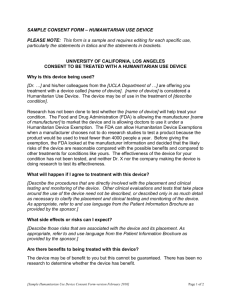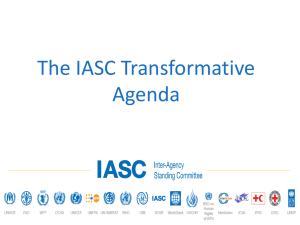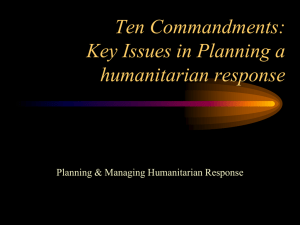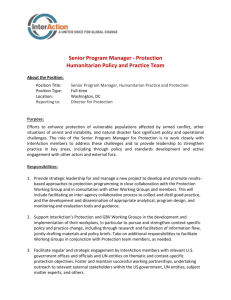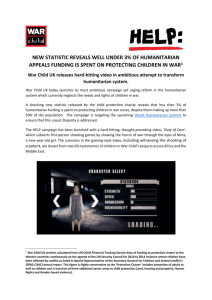Humanitarian Leadership Program
advertisement
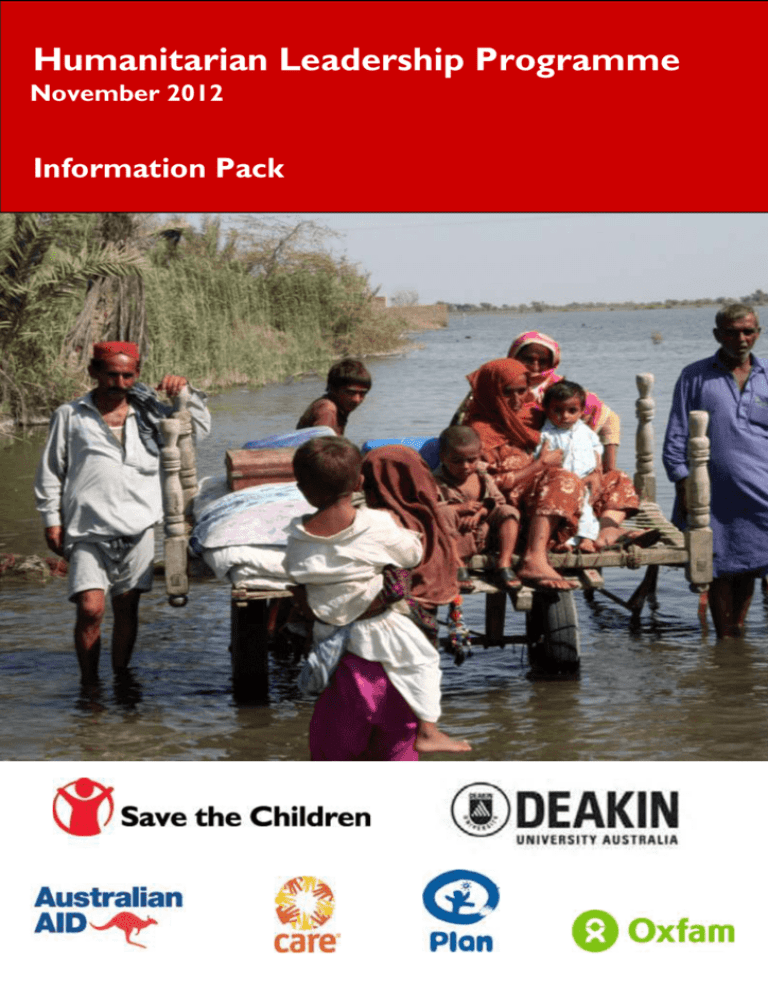
Humanitarian Leadership Programme November 2012 Information Pack 1 Take the next step to develop your leadership For a second year, Save the Children, in partnership with Deakin University – and generously supported by AusAID – is pleased to offer humanitarian professionals from Asia-Pacific and beyond the opportunity to participate in the Humanitarian Leadership Program. This program is designed to enhance the skills, knowledge and leadership capability of current and future humanitarian leaders in (but not limited to) the Asia-Pacific region. Save the Children are running the Humanitarian Leadership Program in conjunction with partner agencies including World Vision, CARE, PLAN and Oxfam, with the support of other agencies. Program objectives • To provide humanitarian professionals with an intensive, challenging and richly rewarding personal development experience that gives them the capability and confidence to lead humanitarian operations • To make a significant contribution towards the professionalization of the sector • To improve the quality of leadership offered by NGO’s responding to humanitarian disasters from disaster risk reduction to managing major responses and leading the transition to long-term recovery and development. • To develop a multi-agency and multi-national cohort of humanitarian leaders who have shared a common learning experience and are committed and able to improve humanitarian operations across the region • To create a collaborative approach to learning across agencies throughout the Asia-Pacific region that directly impacts how we work together to achieve our goals. About the Humanitarian Leadership Program Who is it for? This program is for senior managers working in the humanitarian and development sector with at least three to five years experience working with recognised Non-Government Organisations and who want to develop their leadership skills to make a positive contribution to the future of the sector (min 2 years in a managerial role). • • • • • • • • Program endorsed by Deakin University Future Recognition of Prior Learning (RPL) - once academic accreditation achieved Relevant to the current humanitarian environment Designed and led by leading humanitarian practitioners Opportunity to learn with and become part of a growing cohort of graduates from across the region High profile speakers Strong combination of theoretical and experiential learning Funded by AusAID and Save the Children Accreditation: Successful participants will receive an Endorsed Program Certificate from Deakin University – we expect the program to be recognized as a formal post-graduate Certificate Program in the coming months. Duration: Part One of the program will commence in November 2012. The entire program will run over a period of eight months. (Please see the schedule below.) 2 Humanitarian Leadership Program Schedule Part Part One Dates Activity Location Diagnosing the Humanitarian System Distance / eLearning 26 Nov 2012 – 26 Jan 2013 Home-based 5-10 hrs study per week Part Two Developing Humanitarian Leadership 28 Jan 2013 – 3 Feb 2013 7-day residential Melbourne, Australia Part Three* Delivering Humanitarian Operations Distance / eLearning 11 Feb 2013 – 13 May 2013 Home-based 5-10 hrs study per week Part Four* Demonstrating Strategic Leadership 8-day residential + ongoing 27 May 2013 – 3 Jun 2013 mentoring & Personal development Indonesia (tbc) plans *Selection of participants for Parts Three and Four will be based on performance and assessment in Parts One and Two. As an assessed course, there is no guarantee of progressing to the Third and Fourth parts of the program. The entire program will run over 8 months and participants must be prepared to complete all four parts of the program. Program content overview This program examines the leadership and strategy issues faced by managers in the humanitarian sector. It covers the principles and methodologies of humanitarian operations and explores the organizational processes and leadership practices that enable humanitarian teams to deliver in the most challenging contexts. The program takes a systemic perspective encompassing disaster risk reduction, effective response delivery and transitioning to recovery. Going beyond theoretical learning, the course provides participants with the experiences, support and challenge that will help them develop their skill and confidence in offering leadership to others. Participants will benefit from high quality feedback and support from experienced coaches and facilitators in addition to peer feedback, 360° feedback, psychometric assessment and mentoring. The distance learning elements of the program require a commitment of between 5 – 10 hours per week Key questions that this course will address o What are the major challenges and changes impacting the humanitarian sector and what can we do together to address these? o What are the best ways to organise and lead teams in high-consequence, high-uncertainty, rapidly evolving humanitarian contexts? o What is the role of leadership in such situations and which behaviors and skills are most important? o What can we do to develop our own skills and the leadership we offer others? 3 4 Topics covered • Humanitarian system & actors • Emerging trends and challenges • Humanitarian principles, theory and ethics • Strategic issues in leading humanitarian responses • Role of leadership in humanitarian contexts • Decision-making in humanitarian contexts • Disaster Risk Mitigation and Reduction • Human resource and financial management in emergencies • Humanitarian operations – design and delivery • Managing multi-sectorial humanitarian responses • Leading the transition from response to recovery, through to development Learning methodology o o o o o o o o o o Residential workshops and seminars Tutorials and small-group work Scenario-based learning Distance and online learning 1-2-1 Coaching Mentoring Psychometric assessment Personal learning journal 360° Feedback Personal development plans Assessment elements o o o o Written Assignments Assessed group and individual exercises Exams Project work Costs The program is sponsored by AusAID, enabling us to offer this significant learning and development opportunity for no fee. Costs covered include: o distance learning materials and e-learning platform o assessment and training o coaching and mentoring o program certificate (on completion) o accommodation and all meals during the residential trainings (part 2 and 4) Costs not covered: o flights to and from the residential trainings (venues are likely to be Australia and Indonesia) o accommodation or subsistence costs for time in country, outside of the residential training dates o any personal expenses incurred during the distance learning modules Application Process Places on the programme are limited and therefore we will only select participants who are suited to the level of this training. The program also represents a significant investment of participant time and energy – we need to believe that you have considered this fully and are able to make the necessary commitment. Successful applicants will need to explain how the training is relevant to their role and how they will be able to directly apply their learning in their work. We will inform successful applicants by 19th October 2012. 5 If you are interested in applying then please go to www.XXX for more information. Program partnerships The Humanitarian Leadership Program is a bold and innovative approach to improving the leadership of the sector. The first program run in 2011/2012 demonstrated the value of the collaboration between Save the Children, Deakin University, AusAID and our partner agencies. Over 30 participants from more than 15 countries graduated having benefited from this unique learning experience. Save the Children 2011 Participant Quotes: Save the Children has worked on the issue of professionalization and humanitarian leadership for several years. This includes designing and developing sector leading programs such as the Emergency Operations Program used by the Gates-funded Emergency Capacity Building Project, and the Consortium of British Humanitarian Agencies. The Humanitarian Leadership Program builds on this success and represents Save the Children’s ongoing and significant investment in developing capacity in the sector. Deakin University Deakin University is the academic partner for the Humanitarian Leadership Program and has made a major contribution to its success. Save the Children is working with Deakin University on the full accreditation of the program, including how to integrate the program into a formal academic qualification. AusAID AusAID are providing three-years financial support through the Humanitarian Partnership Agreement that it holds with Save the Children. Humanitarian Partnership Agreement Save the Children are running the Humanitarian Leadership Program in conjunction with partner agencies including CARE, PLAN and Oxfam and other agencies. 6 If you have any questions regarding the Humanitarian Leadership Programme, please contact: HLPInfo@savethechildren.org.uk 7




